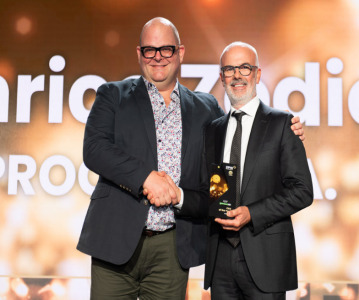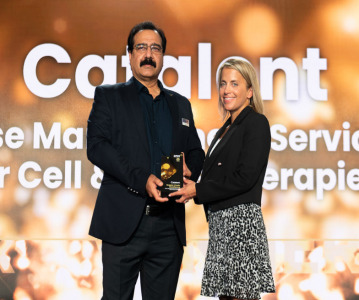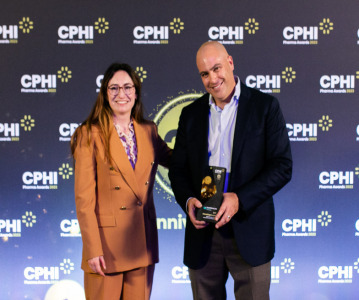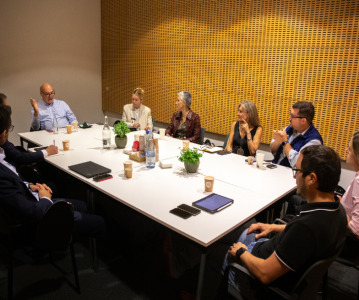CPHI Barcelona 2023 – From the Floor

It's that time of year again - the biggest pharma event of the year comes to Spain this October for CPHI Barcelona 2023. Follow our Editors Vivian Xie and Lucy Chard as they worked their way through the conference, bringing highlights from content sessions, panel discussions, and much more from Fira Barcelona!
CPHI Barcelona aims to unite suppliers, innovators, and pharma professionals at the heart of the industry, to enable collaboration and build relationships that last. The event provides a major opportunity for businesses, large and small, to connect, spanning the entire pharma supply chain. It's a place where thought leaders and trailblazers come together and deliberate over the future.
The Content team had a brilliant time wrapping up the show, and can't wait for next year with more successful content sessions, industry panels and presentations, and many more surprises ahead! Hope everyone had a great time at CPHI Barcelona - we'll see you next year!

Diversity
This year at CPHI Barcelona, we're championing diversity of race, gender, religion, sexuality, ability, and more with our Hiring for Diversity track. Diversity is not just a social trend - it is a business imperative with lasting implications for all involved in the pharmaceutical industry.
Featuring keynote addresses on diversity as a business priority and a panel on hiring for the future, we're proud to support initiatives for diversity at CPHI this year. Follow along as we cover diverse business practices throughout the show.
Keynote Address - Diversity: A Business Imperative
Elizabeth Guitart, Head of Healthcare HR International at Merck (and one of our Women in Pharma leaders), heads our Diversity hub presenting on how Diversity, Equity, and Inclusion initiatives are a key driver for innovation in the pharmaceutical industry. She starts with what DE&I means for the pharma community with a fitting metaphor – diversity is where everyone is invited to the party, equity is when everyone can contribute to the playlist, and inclusion is when everyone is welcomed to celebrate. “We have a diversity of focus areas and aspirations, with inclusion, gender equity, and cultural and ethnic diversity in leadership.
To make our strategy a reality, we must have the right initiatives. 44% of our general management are female leaders, but there is always room for improvement. We are enhancing sponsorship programs and mentorship programs to support employee networks. Everything starts with intention.”
Merck’s first DE&I report was published in 2022, and opens a window into intensified DE&I efforts. Reflecting on Merck’s journey progress towards an equal workforce, Guitart emphasises the possibility for business development and innovative healthcare achievements when implementing DE&I initiatives.
Panel Discussion - Hiring for the Future of Pharma
Mahmoud Assy, Founder & CEO of Eufonia Diversity, hosts our panel discussion on Hiring for the Future of Pharma, focusing on diversity in recruitment and talent retention. Starting strong with a question on the state of talent acquisition and retention, Neil Kelly, Talent Advisor and Founder of Vector Partners and Talent Sandbox, starts by giving kudos to the intentions of many organisations. “Our opportunity now is to take that one step further and evolve the theory into practice,” Kelly states, referencing Guitart’s keynote address just moments before. “Having the intent is not always enough. You also have to have the systems and processes of working to embed those intentions you are trying to implement.”
Sanobar Syed, Diversity Lead for Women Leaders in Pharma, adds: “The fact that we’re sitting here and talking about diversity is progress. I have seen this growth of DE&I in the industry. I still feel there is a lot more to do but I understand it’s one step at a time. It is intentions coupled with actions that makes progress.”
“I see that progress, especially in big multinational pharmaceutical companies,” Elizabeth Guitart comments. “I really believe that healthcare and pharma companies have a responsibility to help other smaller companies in implement DE&I initiatives. I also see progress in mindset, but still there is more we can do when talking about representation – only 20% of leadership positions in pharma companies are women.”
.png)
.png) “What are the biggest challenges you have faced while doing this work on such an international scale?” Assy asks the panellists. Guitart comments that the most challenges she has faced in her line of work is understanding as a company that a mix of regions and implementing a global mindset can be the key to diversity. “Just to add on, when you acquire organisations, the expectation is that the company acquired will understand the company culture,” Kelly comments. “On top of regional differences, you might have departmental differences that need to go through some re-education systems and learning from scratch of what the organisation’s expectations are.”
“What are the biggest challenges you have faced while doing this work on such an international scale?” Assy asks the panellists. Guitart comments that the most challenges she has faced in her line of work is understanding as a company that a mix of regions and implementing a global mindset can be the key to diversity. “Just to add on, when you acquire organisations, the expectation is that the company acquired will understand the company culture,” Kelly comments. “On top of regional differences, you might have departmental differences that need to go through some re-education systems and learning from scratch of what the organisation’s expectations are.”
Sanobar also points out that DE&I might look differently across nations and backgrounds. With these differing definitions, there comes a specific set of challenges when implementing DE&I initiatives, particularly in managerial positions. “I’m just intrigued going through that transition in hiring, managing those emotions within the organisation – how did that go for you?” Kelly asks Syed. She responds “The first emotion, as I’m sure is the same for all, is what’s going to happen? As much as we try to secure the best talent, these things do happen. You must be focused on your people. You don’t want to disrupt your cycles but more importantly, from leadership position, your culture with open communication windows.”
When Assy asks about using data to effect change, Guitart mentions that the trend of using data will be hugely impactful not only because of the amount of data available, but also the strategies and technologies to extract meaning from the data. “The measurements [from the data] is something we help use to advocate to people in strategic positions and add value to these topics. Someone was asking me about artificial intelligence, and I believe AI is not going to replace people. But people who apply AI will replace those who don’t.” Syed agrees, citing a DRIP syndrome (Data Rich, Insight Poor) of organisations that are unable to use technologies and data analytics to carry their business forward.
“We need to understand that the skills gap is only going to continue to grow,” Kelly adds. “It’s going to grow because of that technology and it’s going to be a challenge – AI is driving a lot of this, and that’s not going to change. We need to embrace that technology to facilitate innovation and thinking and collaboration.”
“When it comes to DE&I, some regions are able to gather a lot of data and draw insights from the data, but other regions of the world, that is more difficult – there are certain regulations that limits access to this analysis,” Assy asks. “How do you face this challenge when making sure we are inclusive of different groups?” In regards to this question, the panellists all brought up a trending topic in the pharmaceutical industry: upskilling.
Based in Barcelona, Guitart explains the strategies her organisation utilises to implement an inclusive and open recruitment process as a first point of entry towards DE&I. Training recruiters to challenge the hiring managers and reviewing interviewing processes to consider candidates of a diverse background and experience/skill level benefits the organisation with a diversity of ideas and people.
“When I was at Thermo Fisher, we implemented this 70% theory. Candidates simply did not fulfil all requirements almost 90% of the time,” Kelly draws from his experiences. “So with this 70% theory, rather than looking for why you don’t hire them, look for the reason you DO hire them and create an onboarding plan that fills the 20-30% gaps in skill.”
“I think topics such as sustainability and diversity are now a business incentive – you look at any top pharma report, there will be an ESG section. There will be a diversity section,” Syed states. “Now we have supplier diversity. We are now extending that diverse initiative to minority-owned business, women-owned service providers etc. And I think that’s where we are seeing a lot of progress and innovation. That is a cohesive diversity strategy to not only fuel your talent but to also look at an external facet to bring more talent that is not just performative.”
Sustainability
Last year at CPHI Frankfurt, our sustainability track was incredibly successful, giving attendees some real insights from global experts in ESG. This year at CPHI Barcelona we are continually committed to delivering an environmentally and socially responsible CPHI – from using 100% renewable power to the Better Stands programme. We have the Sustainability Centre in Hall 8.0, absolutely worth stopping by here on your rounds of the conference.
.png)
We have also partnered with several leaders in sustainability in pharma, Olon, UPS Healthcare, Rontis, and Procaps. As part of the sustainability content, we held a presentation on Getting Started on Sustainability, where each of our partners gave a presentation on their work and joined a discussion about how best to start tackling sustainability as a company and what programmes and strategies are available to help.
.png)
Ahead of the show we interviewed each of our partners to hear more about their goals and strategies in sustainability. See the interviews here:
 CPHI Barcelona Sustainability Partner Interview – Olon pushes for progress
CPHI Barcelona Sustainability Partner Interview – Olon pushes for progress
 CPHI Barcelona Sustainability Partner Interview – UPS Healthcare committing to communities
CPHI Barcelona Sustainability Partner Interview – UPS Healthcare committing to communities
 CPHI Barcelona Sustainability Partner Interview – Rontis' mindful management
CPHI Barcelona Sustainability Partner Interview – Rontis' mindful management
 CPHI Barcelona Sustainability Partner Interview – Procaps' improvement through innovation
CPHI Barcelona Sustainability Partner Interview – Procaps' improvement through innovation
Keynote speakers
First up with our conference coverage, we have a few previews of the keynote speeches from our conference tracks. All the content at the event is free to attend, open to everyone! There are several different tracks held across the two days, make sure you take a look at the full agenda here, so you can plan out which sessions you want to attend!
We caught up with Vinay Saluja (VS) – Global Head Development Services at Novartis Global Biotech Cooperations, contract manufacturing unit of Novartis – ahead of his session at CPHI Barcelona, which explores the current state of the CDMO landscape he delves into the specific considerations in outsourcing for biologics and cell and gene therapies.
Read the full interview here.
Following up with another of our speakers, Sheila Ann Mikhail (Co-Founder and Former CEO of AskBio) talks about her Keynote address on Next-Gen Biomanufacturing. She states that she particularly wants to highlight how to make cell and gene therapies more affordable and accessible, expecially for the treatment of rare diseases. She emphasises that costs need to be driven down in the manufactuiring stages, by leveraging new technologies, to be able to make this happen.
See more of what Sheila has to say here.
Innovation
CPHI Barcelona aims to bring the pharma industry together, with an idea of sharing knowledge between industry and thought leaders to expand potential. As a part of this mission, we play host to the Start-Up Market and a Product Innovation track on site in Barcelona. By supporting smaller companies and new ideas we are hoping to inspire innovation in the industry and find new solutions that can help the pharma field progress.
To highlight the Start-Up Market, where 40 Start-Up companies are showcased, we teamed up with CCD Partners, who have created a Disruptor Watchlist where they've taken 21 Start-Ups and anaylsed them, finding out what their future plans are and providing experts insights.
See the infographic here for a teaser of the Watchlist.
Day 1 - We started bright and early this morning, heading to a breakfast for the Start-Up companies exhibiting at the show, hoested by Start-Up Programme Manager, Sophie Whitehead. The breakfast gave an opportunity for all the Start-Up entrepeneurs to meet and get to know eachother before diving into the show.
The Start-Up Market has been drawing crowds all day, as you walk through Hall 3 you can't help but stop and chat to the entrepreneurs lining the walkways, and make sure you stop to hear their pitches too!
.png)
.png)
Content
Our content sessions for CPHI Barcelona have been meticulously planned to bring you the most relevant, most interesting, and most helpful presentations and speeches. With speakers from a range of pharma companies and regulators, we're aiming to disseminate this value to the CPHI audience, make sure you don't miss out on these unique learning opportunities!
If you missed any content sessions, not to worry, all sessions are available to watch on demand on CPHI Online.
Day 3 - Thursday 26 October
The final day of CPHI Barcelona has arrived and while we are sad to close out the show, there's still plenty of time to trade, innovate, create, and participate in our remaining sessions and pitches. Grab a coffee (Procaps is rumoured to be serving the best) and stay tuned!
.png)
.png)
Day 2 - Wednesday 25 October
The panel discussions are really coming up trumps in Barcelona, getting to hear from a diverse range of experts on some really intriguing topics has been giving our audience some real food for thought. On our Future Therapies Track, sponsored by Sequens, we have the panel: 'Why Building a Collaborative Network is Essential for Rare Disease Therapies' with Rajiv Khatau from LODAAT, Nicolas Chornet from Moderna, Alok Tayi from Vibe Bio, and Marc-Olivier Mignon of Sequens.
The panel manages to cover a range of topics that come into the rare disease space, looking at the factors that affect getting drugs to market, clinical trials, and the future of the field. These include pace, geography, among others to make up the critial network to be able to deliver medications to the patient. Seeing a lot more collaboration and the increased use of technology, the tight integrative loops needed here, can help to make this happen.
Digitalisation in rare disease is being hindered by the regulatory aspects. But it can be used to accelerate the pipeline, to get to the patient faster.
Nicolas comments on trials - designing a first in class trial, is not the same as designing a best in class trial in these disruptive areas. It is critical for the patient here. .png)
Nicolas says the faster we information back from the patient, about how they feel etc, the faster we can tweak the trial design. It's not an area that's overlooked but it's something we need to look more at and harness the potential here.
Rajiv on working with regulatory bodies in rare disease: The FDA is actually very cognizient and is trying and the drug development and the rare disease drug development. I think they are working together, but should the indutry get together, yes of course, but we all have our own businesses to run so there is a race to get to market first too.
Alok brings out a salient point: 'I don't think we consider this enough in this space, when you go from 1 to 40 programmes, that's where you need tech transfer, and there needs to be more collaboration there so that we can use that to it's full potential to make those tranistions easier'.
Final remarks from the panellists cover:
Marc-Olivier: 'From the CDMO space there is a way to challenge the field, challenge the way we are working and I am confident we are going to be able to change the way we can help rare disease patients.'
Nicolas: 'Digitalisation is fuelling a lot of progress, and I am very enthusiastic about the future of that'.
Alok: 'Diseases will become more hetereogenous, drugs will become more programmeable, and providers will care more about velocity.'
The Biomarker Factory - Amanda Heslegrave, Senior Research Fellow at the UK Dementia Research Institute, has been working in narrative diseases, focusing on fluid biomarkers. With the UK DRI, Heslegrave emphasises the level of collaboration with the Biomarker Factory to achieve the goals set out by and for their team. Biomarkers in cerebrospinal fluid was the team’s first focus, but has since shifted since patient aversion to lumbar punctures. The focus has now focused to blood-based biomarkers as less invasive and an inexpensive method for retrieving biomarkers. With blood biomarkers, testing for all communities can be done to change the course of the disease progression. “There have been treatments but no modifications,” states Heslegrave.
The future of mRNA applications - Hosted by Raman Sehgal, host of Molecule to Market podcast, interviews Nicholas Chornet, Senior VP International Manufacturing at Moderna, on the future applications of mRNA applications. As one of the first providers of an mRNA vaccine in response to the COVID-19 pandemic, Chornet gives a brief history of Moderna’s rapid growth during the pandemic. “It was a tremendous effort where everybody in the company and externally pulled together, leading us to where we are today.”
Though Sehgal cites mRNA applications as the ‘forgotten step-child that rose to the top of the industry’, Chornet emphasises Moderna’s decade-long work in mRNA therapeutics long before the COVID-19 pandemic thrust them into the spotlight. With research and trials in applying mRNA to treat oncology, latent diseases, and even the flu, platforms for developing mRNA therapeutics are on the rise. Some challenges, however, emerged during the COVID-19 pandemic. Chornet states that more effort is going into technological advancement of the platforms with tools such as AI and other digitisation methods. “We integrated self-learning algorithms and are very precise in designing the mRNA we need with the molecular structure we need for the target. That is continuing to evolve.”
If you’re interested in learning more about mRNA applications, future applications, and packaging considerations, read our article on delivering on mRNA therapeutics.
Our track on Future Therapies, sponsored by Seqens, begins with a keynote address by Alok Tayi, Founder of Vibe Bio, who shares his experience in R&D of innovative therapies, and how the rare disease space is a critical endeavour in the life sciences domain.
 He gives a personal story about his daughter, who suffered two rare diseases at birth. “It was surprising to me and became a passion for me to understand the root biology of a disease, and why we don’t have any dedicated medications for these rare diseases. Bias exists in deciding what drugs to fund. Comfort zones for investors include validated targets, familiar diseases, and popular modalities. There is an opportunity to extend the sphere in which we innovate, and I believe that future of drug development to be focused in rare disease.”
He gives a personal story about his daughter, who suffered two rare diseases at birth. “It was surprising to me and became a passion for me to understand the root biology of a disease, and why we don’t have any dedicated medications for these rare diseases. Bias exists in deciding what drugs to fund. Comfort zones for investors include validated targets, familiar diseases, and popular modalities. There is an opportunity to extend the sphere in which we innovate, and I believe that future of drug development to be focused in rare disease.”
Vibe Bio provides a combination of software and capital to move the needle of pharmaceutical innovation. Utilising AI, Vibe Bio analyses drugs and select top investments. Technology can support new therapies in generative design, pipeline priority, and providing faster insights in patient selection and planning of drug development pipelines. “It’s an exciting time for us in the biotech and capital space. Today’s sessions on Future Therapies will provide a great breadth of opportunities here.”
And we're off on day 2! Walking around the halls, it's great to see the creativity that's gone into all our exhibitors' booths.
Why not stop by Thermo Fisher Scientific's booth and grab a personalised face scan for a new LinkedIn profile picture? While you're there, be sure to check out our Trend Report in partnership with Thermo Fisher Scientific on CDMO and CRO collaborations for a patient-centric future here.

Or swing by KSM-66 Ashwagandha's booth to pick up a special tote bag with a beautiful design, and read through our Trend Report in collaboration with KSM-66 Ashwagandha to learn about the potential of herbal medicines and Ashwagandha for the pharma industry.

Day 1 - Tuesday 24 October
The CPHI Pharma Awards celebrates the achievements, innovations, and collaborative efforts of all across the pharmaceutical supply chain. Recognising the work of those pushing the industry forward, see here for a full list of winners of the 2023 CPHI Pharma Awards!

The UAE Health Ecosystem - A special presentation by His Excellency Dr Amin Al Ameeri, Assistant Undersecretary of Health Regulation of the UAE Ministry of Health & Prevention, explores the development of a pharmaceutical ecosystem, using the UAE as a prime example of a thriving healthcare sector.
“We are, according to IQVIA, the number one country to approve innovative drugs, ahead of the FDA, EMEA, and MHRA,” Ameeri states.
 Ameeri gives an in-depth analysis of the landscape of healthcare services and pharmaceutical investment in the UAE. For example, the UAE outnumbers the US in hospital accreditation. Technologies such as AI are also of great importance to this development of a pharmaceutical ecosystem in the UAE.
Ameeri gives an in-depth analysis of the landscape of healthcare services and pharmaceutical investment in the UAE. For example, the UAE outnumbers the US in hospital accreditation. Technologies such as AI are also of great importance to this development of a pharmaceutical ecosystem in the UAE.
“If one of your doctors or pharmacists is based in Australia, they can use a mobile device and login to a platform to bring together professionals from around the world. The AI can track the movement of eye contact and limbs to interact with others in the ‘room’. AI can also map a whole factory for investors and organisations.”
 To conclude his presentation, Ameeri exemplifies how the private and public sectors can come together to benefit citizens of the UAE with numerous freezone areas for foreign investment, management of pharmaceutical factories, and more to provide a resilient supply chain capable of withstanding disruptions that sever access to medicines and treatments for patients: "The UAE is a new country, and a small country. This is just one example of how keen we are to provide services to companies to invest in our country."
To conclude his presentation, Ameeri exemplifies how the private and public sectors can come together to benefit citizens of the UAE with numerous freezone areas for foreign investment, management of pharmaceutical factories, and more to provide a resilient supply chain capable of withstanding disruptions that sever access to medicines and treatments for patients: "The UAE is a new country, and a small country. This is just one example of how keen we are to provide services to companies to invest in our country."
Decarbonising Chemical Supply Chains with the Product Carbon Footprint Guideline - this talk from Merck drew.png) yet another fit to bursting crowd. Mathias Lemke from Merck Darmstadt gives a succinct talk on how compaies can better prepare themselves to acheiving their decarbonisation goals.
yet another fit to bursting crowd. Mathias Lemke from Merck Darmstadt gives a succinct talk on how compaies can better prepare themselves to acheiving their decarbonisation goals.
Merck is apart of the Energize programme, it is an opportunity for our partner to get educated and learn how to reduce carbon emissions, and optimise processes.
'Something needs to be done, but something is not good enough to acheive our target by 2040, how can we do that? ...We multiplied the spend on specific techniques, which looks good, but if done properly we can actually reduce spend whilst reducing carbon emissions.'
Working with Together for Sustainability, working within the structure they provide and exisiting strategies in place. The talk covers many aspects of increasing energy efficiency and ultimately acheiving better circularity.
Implications of the FDA's QMM - Sireesha Yadlapalli, CEO of Pharmatech Associates, gives her insight into the implications of the FDA’s Quality Management Maturity initiative, a state attained when drug manufacturers have consistent, reliable, and robust business processes to achieve quality objectives and promote continual improvement. She clarifies the purpose of QMM:
“There’s a lot of misconceptions about QMM – it is an assessment, not an inspection. It is focused on behaviours, practices, and quality culture. It is not to evaluate product quality. QMM is focused on culture and approach rather than data (which is what quality metrics is for).”

Magnus Blomberg from AstraZeneca gives a presentation on building a collaborative supply chain for biological products. He gives an overview of the growth of biologics, how it has progressed with the expansion of drug modalities for multiple sub-populations and to access next-generation therapies.
'There are currently thousands of projects on cell therapy, but only six commercial products avaliable today'
There are numerous supply chain challenges that mean that these projects are not translating to commercial therapies just yet. Blomberg states that we need to engage everyone and collaborate across the whole supply chain. By using agile and innovative technologies and mindsets, whilst partnering with other industries and regulators this can lead to more effective use of resources and bring products to market more quickly.
Innovative drugs now exceed conventional drugs in revenue growth. Camille Dumont of Lonza CHI presents on Capsugel Enprotect capsule, an enteric capsule that can overcome certain challenges facing APIs during formulation and API delivery. One of these challenges include the pH of the stomach and intestinal environments.
.png) In her presentation, Dumont gives a thorough analysis of the formulation of an enteric capsule capable of delivering APIs in low intestinal pH levels. “This is really exciting in new drug modalities because it is capable of showing that small molecules can protect larger drug molecules and proteins,” she states.
In her presentation, Dumont gives a thorough analysis of the formulation of an enteric capsule capable of delivering APIs in low intestinal pH levels. “This is really exciting in new drug modalities because it is capable of showing that small molecules can protect larger drug molecules and proteins,” she states.
The keynote address for our ‘Formulating the Future’ track is being given by Ferenc Marofka of the European Commission. Though not a formulation expert, Marofka gives an overview of the European policies for innovation in manufacturing and formulation, particularly after the COVID-19 pandemic.
.png) “One thing that we really haven’t done in the past is having a policy for pharmaceutical manufacturers. Manufacturing and supply chains weren’t really in focus for EU policies until COVID-19. COVID-19 triggered novel EU actions with global joint procurement of PPE and medicines. We also implemented a Task Force for industrial scale-up of COVID-19 vaccines. This was a learning exercise for us in EU manufacturing. For shortages, we need to act to increase resilience and better understand supply chain vulnerabilities.”
“One thing that we really haven’t done in the past is having a policy for pharmaceutical manufacturers. Manufacturing and supply chains weren’t really in focus for EU policies until COVID-19. COVID-19 triggered novel EU actions with global joint procurement of PPE and medicines. We also implemented a Task Force for industrial scale-up of COVID-19 vaccines. This was a learning exercise for us in EU manufacturing. For shortages, we need to act to increase resilience and better understand supply chain vulnerabilities.”
Marofka highlights how the EU Commission proposed initiatives for urgent measure to ensure sufficient production and availability of the most critical medicines and components in Europe. “There was something to be done at the manufacturing level,” he states.
We're kicking things off with our Keynotes!
Packed out sessions already, standing room only!
.png)
Related News
-
News CPHI Pharma Awards 2023 – Sustainability winners: Schneider Electric
After another year of impressive nominations for the CPHI Pharma Awards our winners were announced at CPHI Barcelona in October 2023. In this series of interviews, we speak to the people and teams behind the award-winning projects, concepts, and techno... -
News CPHI Pharma Awards 2023 – At the Heart of Pharma winners: Merck KGaA
After another year of impressive nominations for the CPHI Pharma Awards our winners were announced at CPHI Barcelona in October 2023. In this series of interviews, we speak to the people and teams behind the award-winning projects, concepts, and techno... -
News CPHI Pharma Awards 2023 – Packaging & Machinery Winner: Gasporox
After another year of impressive nominations for the CPHI Pharma Awards our winners were announced at CPHI Barcelona in October 2023. In this series of interviews, we speak to the people and teams behind the award-winning projects, concepts, and techno... -
News CPHI Pharma Awards 2023 – CEO of the Year Winner: Enrico Zodio, PROCOS S.P.A.
After another year of impressive nominations for the CPHI Pharma Awards our winners were announced at CPHI Barcelona in October 2023. In this series of interviews, we speak to the people and teams behind the award-winning projects, concepts, technologi... -
News CPHI Pharma Awards 2023 – Supply Chain Excellence Winners: Catalent Case Management Services
After another year of impressive nominations for the CPHI Pharma Awards our winners were announced at CPHI Barcelona in October. In this series of interviews, we speak to the people and teams behind the award-winning projects, concepts, and technologie... -
News CPHI Pharma Awards 2023 – API Development and Innovation Winners: Snapdragon Chemistry, a Cambrex Company
After another year of impressive nominations for the CPHI Pharma Awards our winners were announced at CPHI Barcelona in October. In this series of interviews, we speak to the teams behind the award-winning projects, concepts, and technologies. -
News Navigating the Future: Challenges and Opportunities in Pharma Innovation and Investment – CPHI Barcelona 2023 Roundtable Report
In this comprehensive downloadable report, hear from a range of experts in finance and investment in the pharma industry on what investment trends will be shaping the future of the industry, in Catalonia, and the wider world. -
News CPHI Barcelona: Outsourcing in Manufacturing Operations
During CPHI Barcelona 2023, insightful content sessions offered attendees the chance to explore trending topics with expert speakers and panellists. Here, we summarise what the pharma industry and supply chain are talking about the most.
Position your company at the heart of the global Pharma industry with a CPHI Online membership
-
Your products and solutions visible to thousands of visitors within the largest Pharma marketplace
-
Generate high-quality, engaged leads for your business, all year round
-
Promote your business as the industry’s thought-leader by hosting your reports, brochures and videos within your profile
-
Your company’s profile boosted at all participating CPHI events
-
An easy-to-use platform with a detailed dashboard showing your leads and performance



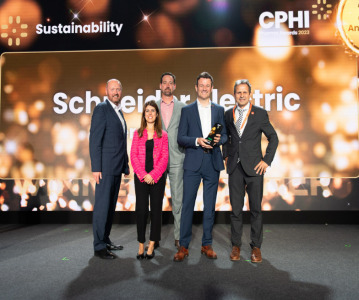
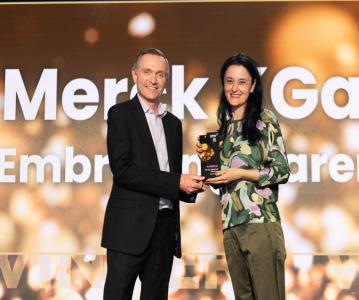
.png)
